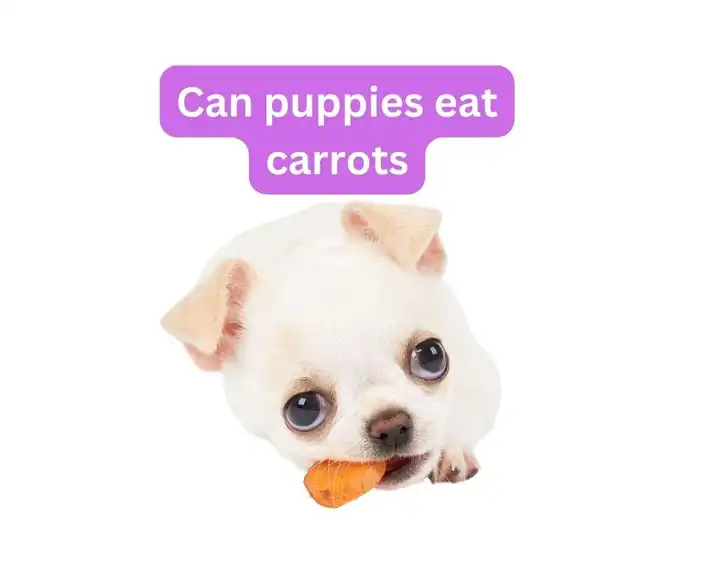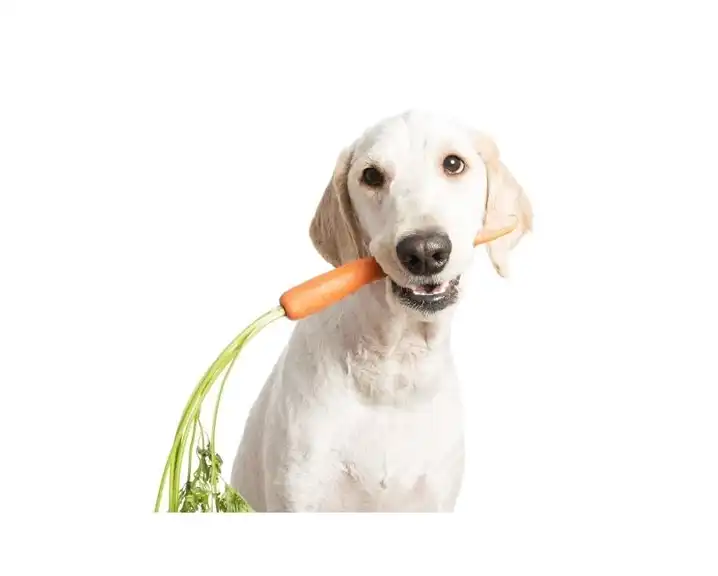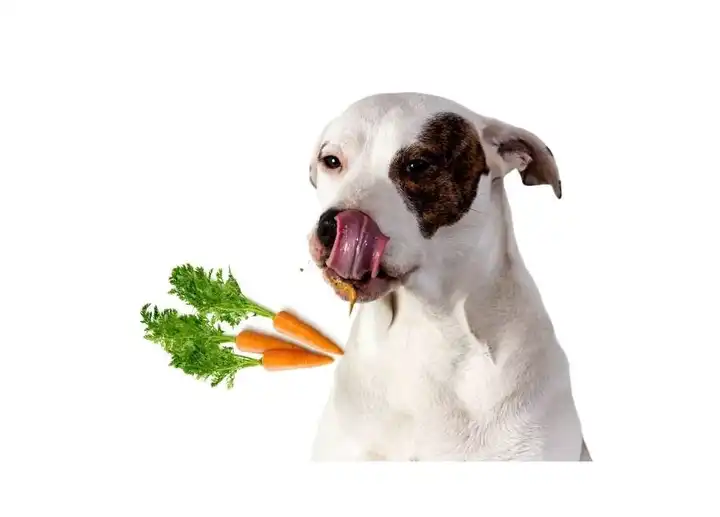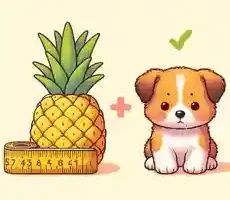The early stages of a puppy’s life are critically formative, and they demand vigilant attention to diet and nutrition. One question frequently asked by pet owners is – Can puppies eat carrots? This article attempts to conduct a thorough nutritional investigation to address this query.
Can Puppies Eat Carrots?
Yes, puppies can eat carrots. Carrots are safe and healthy for puppies, offering numerous nutritional benefits, including essential vitamins and fiber. They can also support dental health due to their crunchy texture. However, it’s vital to introduce carrots in moderation and always supervise your puppy when eating to prevent choking hazards.

II. Understanding a Puppy’s Dietary Needs
Good nutrition recreates an essential role in your puppy’s development and expansion. A well-balanced diet aids in establishing a solid foundation for a healthy, vibrant life. Let’s explore the basic dietary needs of puppies, supported by expert opinions.
Protein
Protein is a critical nutrient for puppies, helping their rapid expansion and evolution. According to Dr. Jennifer Coates, a veterinary advisor with PetMD, puppies require a diet high in protein to help the development of healthy muscles, skin, coats, and other body tissues1.
Fats
Fats provide the most potent basis of energy for puppies. Fatty acids like omega-3 and omega-6 are vital for brain and eye development, skin and coat health, and overall inflammation regulation2.
Carbohydrates
Carbohydrates in foods like grains and vegetables provide puppies with energy and dietary fiber. Dr. Kara M. Burns, a veterinary technician specialist, emphasizes the role of carbohydrates in encouraging healthy digestion and supplying energy for growth3.
Vitamins and Minerals
Puppies require various vitamins and minerals for best health; according to Dr. Jerry Klein, Chief Veterinary Officer of the American Kennel Club, vitamins like A, D, E, and K and important minerals such as calcium and phosphorous important roles in bone development, immune function, and metabolic processes4.
Water
Proper hydration is crucial for puppies. They need constant fresh water to aid digestion, nutrient absorption, and temperature regulation5.
Balanced Diet
It’s crucial to provide your puppy with a balanced diet that meets all their nutritional needs. A high-quality commercial puppy food usually offers this balance. However, treats like carrots can supplement their diet and provide additional health benefits.
Puppies’ dietary needs are intricate and dynamic, changing as they grow and develop. It’s always advisable to consult with a veterinarian for recommendations about your puppy’s diet.
III. The Nutritional Composition of Carrots

Carrots are highly nutritious and provide an array of health benefits. To better understand their contribution to a puppy’s diet, let’s delve into the detailed nutritional composition of this root vegetable, fortified with insights from trusted experts.
- Vitamins: Carrots are rich in several vitamins, particularly vitamin A, in the form of beta-carotene. Dr. Jerry Klein, Chief Veterinary Officer of the American Kennel Club, affirms that beta-carotene is converted into vitamin A in the body, supporting eye health and immune function1. Additionally, carrots contain vitamins K and C, which support bone health and immunity.
- Minerals: Carrots contain an array of essential minerals. They are a good source of potassium, which supports muscle function and nerve transmission. They also provide a modest amount of calcium and magnesium.
- Fiber: According to Dr. Danielle Bernal, a Wellness Natural Pet Food veterinarian, carrots are high in dietary fiber. This contributes to digestive health by adding bulk to the diet and promoting regular bowel movements.
- Natural Sugars: Carrots are considered low-sugar vegetables, making them a healthy treat for puppies.
- Water Content: high water content, around 88-90%, can help keep your puppy hydrated.
It’s important to note that while carrots provide many essential nutrients, they are not a complete food source. They should be considered a supplement to a balanced, nutritionally complete puppy diet. Consult your vet for any concerns or questions about your puppy’s nutrition.
IV. The Pros of Feeding Carrots to Puppies
Feeding carrots to your puppy carries numerous benefits. Carrots are an inexpensive, low-calorie treat packed with vital vitamins and minerals. Let’s explore the advantages and back them up with expert insights.
Dental Health Benefits According to Dr. Leslie Brooks, a licensed veterinarian, crunching on a raw carrot can help clean your puppy’s teeth and gums. The mechanical action of chewing can scrape away plaque, reducing the risk of dental disease.
Digestive Health Enhancement Carrots are rich in dietary fiber, which can support your puppy’s digestion. Fiber adds bulk to the diet, facilitating better bowel movements. Dr. Danielle Bernal, a veterinarian with Wellness Natural Pet Food, points out that the fiber in carrots can help maintain a healthy digestive system.
- Eye Health: The Beta-carotene Effect Carrots are rich in beta-carotene, a powerful antioxidant that the body converts into vitamin A. Dr. Jerry Klein, Chief Veterinary Officer of the American Kennel Club, highlights the role of vitamin A in promoting good vision and overall eye health.
- Low-Calorie: Dr. Marci Koski agrees that carrots can serve as an excellent low-calorie treat for puppies. Their natural sweetness makes them appealing to puppies, while their low-calorie content makes them a guilt-free choice for pet parents.
- Boosting Immunity: It contains vitamin C and other antioxidants that support the immune system. Dr. Jean Dodds, an eminent veterinarian and founder of Hemopet, emphasizes the role of these antioxidants in boosting your puppy’s immune response.
- Remember, while carrots offer several benefits, they are not a replacement for a balanced, high-quality dog food that should form the basis of your puppy’s diet. Always introduce new foods gradually and in moderation, and consult your veterinarian if you have any concerns or questions.
V. Potential Cons of Feeding Carrots to Puppies
Moderation and careful observation are essential to prevent these potential risks.
- Risk of Choking: raw carrots can pose a choking hazard due to their hard texture, especially for miniature puppies. Always supervise your puppy when eating carrots, and consider cutting them into small, manageable pieces to reduce this risk.
- Digestive Issues Some puppies may have difficulty digesting raw carrots. Undigested pieces of carrot may appear in your puppy’s stool. This isn’t typically caused for concern, but if your puppy shows signs of discomfort, diarrhea, or vomiting, stop feeding them carrots and consult a vet.
- Potential for Allergic Reactions: While rare, some puppies may be allergic to carrots. Symptoms of a food allergy can include itching, redness, swelling, or digestive upset. See veterinary advice if your puppy shows signs of an allergic reaction after eating carrots.
- Excessive Sugar Intake: Carrots contain natural sugars. While the sugar content is not high enough to be a concern for most puppies, if your puppy has specific health disorders, such as diabetes, the sugar in carrots could cause problems. Always confer with your vet if you require advice.
- The risk of Overfeeding: it is low in calories; any food given in excess can donate to weight gain. It should be deemed a pleasure and should not exceed 10% of your puppy’s daily caloric intake.
How to Properly Feed Carrots to Puppies

Feeding carrots to your puppy might seem straightforward, but there are recommended steps to introduce carrots into your puppy’s diet properly.
- Start Small: Portion Size and Frequency Starting with small quantities is prudent to ascertain how your puppy reacts to carrots. Monitor for any signs of discomfort or allergic reactions.
- Carrot Preparation: Raw versus Cooked Both raw and cooked carrots have merits. Raw carrots are good for dental health, and cooking makes them easier to digest. You should experiment with both to see what suits your puppy best.
- Ensuring Supervision: Always supervise your puppy while eating carrots, especially if they are served raw or in large pieces.
VII. Alternate Vegetables to Consider
Let’s delve into some healthful alternatives to carrots that your puppy can safely enjoy.
- Broccoli: A Nutritious Alternative Broccoli is a powerhouse of essential nutrients, including vitamins A, C, and K, as well as dietary fiber. These vitamins support the puppy’s immune system, bone health, and vision. The fiber helps promote healthy digestion. However, broccoli has isothiocyanates, which can generate severe gastric disturbance in dogs if ingested in large amounts. Hence, it’s best to offer broccoli in moderation and ideally steamed or boiled to ease digestion.
- Cucumbers: A Hydrating Option Cucumbers are a fantastic hydrating treat for puppies, especially during the hotter months. Composed of 95% water, they are low in calories and fat, making them an ideal treat for puppies. They are also packed with essential vitamins like K, C, and B1 and minerals like potassium and magnesium, promoting overall health. Always ensure to chop cucumbers into manageable sizes to prevent choking.
- Spinach: A Source of Iron and Calcium Spinach is a leafy green vegetable rich in vitamins A, C, K, and B9 (folate) and minerals like iron and calcium. Iron promotes the formation of healthy red blood cells, while calcium aids bone development. However, spinach also contains oxalic acid, which can interfere with the body’s ability to drink calcium and lead to kidney harm if consumed excessively. As with other vegetables, it’s essential to feed spinach in moderation.
- Pumpkin: An Aid for Digestion Pumpkin is a superbly nutritious vegetable for puppies. It’s fiber-rich and can work wonders for puppies with constipation or diarrhea. Additionally, it’s packed with vitamins A and C, which support vision and immunity, respectively. Always cook the pumpkin before feeding it to your puppy, and avoid using any seasonings.
- Sweet Potatoes: A Rich Source of Fiber and Vitamins Sweet potatoes are high in fiber, which aids in digestion and makes them a terrific treat for puppies. Before feeding your puppy sweet potatoes, ensure they are cooked and unseasoned. Raw sweet potatoes can be tough on a puppy’s digestive system.
- Green Beans: Low-Calorie and Nutrient Dense Green beans are a low-calorie vegetable loaded with valuable nutrients, including vitamins C, K, and A, along with fiber and protein. They can be served boiled or raw and are an ideal charm for puppies who need to lose weight or have a big appetite. However, as with all other veggies, they should be fed in moderation.
These alternative vegetables each offer their unique combination of nutrients, making them beneficial additions to your puppy’s diet. It’s always essential to introduce any new foods gradually and observe for any adverse reactions. Lastly, consult your vet before significantly changing your puppy’s diet.
VIII. Conclusion
As we unravel the answer to the question, “Can puppies eat carrots?” it becomes clear that while carrots can be a beneficial addition to a puppy’s diet, they are not without potential risks. Carrots should be given in moderation and under Supervision like any other treat. As a pet owner, it’s essential to maintain a balanced diet for your puppy that meets all its nutritional requirements.



